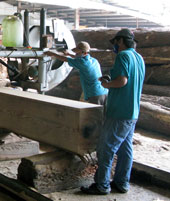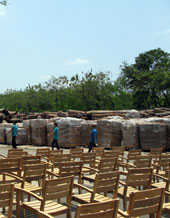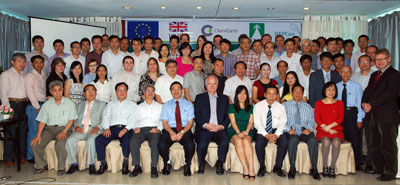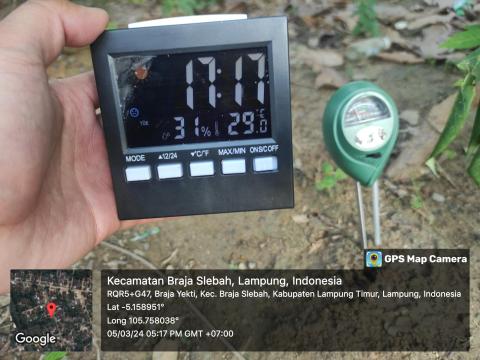New project to boost legal timber trade in Vietnam
On 1 March 2014, NEPCon and our Vietnamese partner Sustainable Forest Management Institute (SFMI) launched a new project. The aim is to equip Vietnamese small and medium sized enterprises with the know-how for satisfying FLEGT requirements and EUTR related buyer demands.
 A new project in Vietnam may help to keep the country’s small wood industries in business whilst overcoming key barriers to expanding legal timber trade.
A new project in Vietnam may help to keep the country’s small wood industries in business whilst overcoming key barriers to expanding legal timber trade.
The project Increasing capacity of Civil Society Organisations and SMEs to implement FLEGT requirements will provide tools and training for small and medium sized enterprises (SMEs) in Vietnam. The aim is to help them to fulfil demands for legal timber whilst supporting Vietnam's FLEGT process.
The project is developed by NEPCon in partnership with the Vietnamese Sustainable Forest Management Institute, SFMI.
Supported by an EU grant, the two organisations are jointly implementing the project over the next three years.
“I am convinced that this project will benefit the Vietnamese timber industry at large and our SMEs in particular”, says Ms Duong Thi Lien, Project Coordinator on behalf of the SFMI.
Vietnam – a processing hub
 Vietnam is negotiating a Voluntary Partnership Agreement (VPA) with the EU and is working towards a licensing system under the EU Forest Legality Enforcement, Governance and Trade (FLEGT) Programme.
Vietnam is negotiating a Voluntary Partnership Agreement (VPA) with the EU and is working towards a licensing system under the EU Forest Legality Enforcement, Governance and Trade (FLEGT) Programme.
The country also epitomises some of the hardest challenges connected with legal timber trade.
Vietnam is known for its large timber processing industry, with the manufactured products in large part exported to markets such as the EU, USA, China and Japan.
High-value products such as furniture from Vietnam are in high demand, and the export is growing. But the Vietnamese companies will be facing the challenge of meeting the upcoming FLEGT criteria in due course.
And whilst the Vietnamese forest sector is still working towards FLEGT alignment, the same issues are troubling overseas buyers in Europe, Australia and the US who need to exercise due diligence.
For one thing, the Vietnamese industry utilises timber from across Asia including from several countries known as high-risk for illegal harvesting. To complicate the matter further, the products – such as furniture - are often assembled and timber species contained in them are not always recognisable.
To meet the objectives of FLEGT and satisfy current buyer demands, the Vietnamese industry needs to set up due diligence securing that timber imported into the country for further processing is of legal origin. However, timber processing companies in Vietnam are typically quite small. They rarely possess the know-how to meet demands for information and assurance.
An opportunity for SMEs and their trade partners
The project aims to seal these gaps. This is done in a two-pronged approach:
1. Timber legality risk assessments will be developed, covering key Asian timber producing countries exporting to Vietnam. Typical supply chains within Vietnam will also be mapped.
2. The project will build the capacity of small and medium scale wood processing and trading enterprises in Vietnam. Through development of practical tools and training-of-trainers, at least 300 Vietnamese SMEs are expected to be equipped with due diligence know-how, including how to make necessary data and documents available to their buyers.  As a first step, the project will develop and test an SME due diligence toolkit in collaboration with about 20 Vietnamese SMEs and up to 20 “Intermediary Organisations” (IOs). IOs are industry associations, NGOs and traders that are in regular contact with the SMEs.
As a first step, the project will develop and test an SME due diligence toolkit in collaboration with about 20 Vietnamese SMEs and up to 20 “Intermediary Organisations” (IOs). IOs are industry associations, NGOs and traders that are in regular contact with the SMEs.
The tools may include forms for collecting and recording information, checklists, letter templates, and country risk profiles. The IOs will form a core team of trainers, extending their knowledge to their SME network within the project’s outreach programme. In parallel, an awareness raising campaign will be conducted amongst the Vietnamese timber industry at large.
Ms Duong Thi Lien says: “We already have local organisations on board that have expressed their willingness to collaborate in testing the toolkit. This is extremely positive. Buy-in from our industry is crucial for the project’s impact”.
The project is still open for interested SMEs and IOs to join. “We invite Vietnamese SMEs, their associations and Western trade partners to contact us if they are interested in our project”, says Ann Weddle, NEPCon Chief Project Advisor. “There are several ways in which they can engage and benefit from the know-how that our project is building. Above all, the country risk assessments, the SME toolkit and the training will help the participating SMEs to mitigate supply chain risk and foster alignment with the FLEGT and EUTR requirements”.
A flying start
March saw the project’s first big stakeholder workshop, co-funded by the British organisation Client Earth. The event was a major draw, attracting over 70 timber supply chain associations, ministries, NGOs, private consultants, SMEs and a few larger enterprises.
A series of international and Vietnamese speakers provided inputs that were followed by lively discussion amongst the audience.
 The importance of the EU trade for Vietnamese industries was highlighted by Mr. Nguyen Ton Quyen from VIFORES, a key Vietnamese timber trade association. He noted that revenue from timber products exported to the EU was 20-25% of the total export revenue in 2013. The audience’s enthusiasm for the project initiative was noticeable and no less than ten organisations signed their commitment to work with the project on the spot.
The importance of the EU trade for Vietnamese industries was highlighted by Mr. Nguyen Ton Quyen from VIFORES, a key Vietnamese timber trade association. He noted that revenue from timber products exported to the EU was 20-25% of the total export revenue in 2013. The audience’s enthusiasm for the project initiative was noticeable and no less than ten organisations signed their commitment to work with the project on the spot.
Ms Weddle says: “I hope this project will assist Vietnam in building a functional and robust Timber Legality Assurance System as the basis for FLEGT licensing in the future, by integrating the needs of SMEs. The impact of the EUTR and similar legislation on the global timber trade is already felt, and it is likely to grow much stronger in the years ahead. Smaller companies run the risk of falling behind if they lack the capacity to adjust to the new market conditions. This project helps SMEs get up to speed, creating a win-win situation”.
She adds: "By increasing the capacity of SMEs to investigate their supply chains and deal with the timber legality requirements we’ll be supporting the fight against illegal logging. At the same time, we are helping SMEs to retain and even boost their trade with the EU and other major consumer markets such as the USA”. 
CONTACT
 If you would like to get involved or know more about this project ,please contact :
If you would like to get involved or know more about this project ,please contact :
Chief Advisor, Ms Ann Weddle at aw@nepcon.org or Project Coordinator Ms Duong Thi Lien at duongtlien@gmail.com.
Quick project facts
- Project title: Increasing capacity of CSOs and SMEs to implement FLEGT requirements.
- Partners: Sustainable Forest Management Institute and NEPCon.
- Financing: The project is 87.6% funded by a grant from the EU Delegation in Vietnam. The budget is 456,499 EUR over 3 years.
Photos by NEPCon, Ann Weddle/NEPCon and Christian Sloth/NEPCon.



